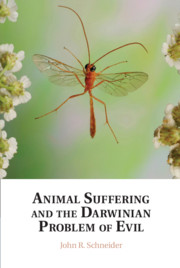Book contents
- Animal Suffering and the Darwinian Problem of Evil
- Animal Suffering and the Darwinian Problem of Evil
- Copyright page
- Dedication
- Contents
- Foreword
- Acknowledgments
- Introduction
- 1 Facing the Darwinian Problem of Evil
- 2 Darwinian Evil and Anti-Theistic Arguments
- 3 Ways around the Problem
- 4 Making a “Case for God” (a Causa Dei)
- 5 Animal Suffering and the Fall
- 6 Narrow Is the Way of World Making
- 7 God-Justifying Beauty
- 8 Suffering “For No Reason”
- 9 Darwinian Kenōsis and “Divine Selection”
- 10 Animals in Heaven
- Bibliography
- Index
8 - Suffering “For No Reason”
Job and the Darwinian Problem
Published online by Cambridge University Press: 17 March 2020
- Animal Suffering and the Darwinian Problem of Evil
- Animal Suffering and the Darwinian Problem of Evil
- Copyright page
- Dedication
- Contents
- Foreword
- Acknowledgments
- Introduction
- 1 Facing the Darwinian Problem of Evil
- 2 Darwinian Evil and Anti-Theistic Arguments
- 3 Ways around the Problem
- 4 Making a “Case for God” (a Causa Dei)
- 5 Animal Suffering and the Fall
- 6 Narrow Is the Way of World Making
- 7 God-Justifying Beauty
- 8 Suffering “For No Reason”
- 9 Darwinian Kenōsis and “Divine Selection”
- 10 Animals in Heaven
- Bibliography
- Index
Summary
In this chapter, the author explores the book of Job for a perspective on the modern Darwinian Problem of evil. He concurs with recent scholars who reject the commonplace reading of Job, i.e., that God refuses to answer Job’s question: how can his suffering be just? He concurs with Carol Newsom that in the divine speeches at the end, God answers Job indirectly in the form of carefully crafted symbolic poetics, the rhetorical structure and imagery of which radically reconstruct Deuteronomic tradition on God and suffering. The author proposes that the treatment of God and wild animals in Job makes the Darwinian configuration of animal suffering more plausible on canonical theism than commonly supposed. He further proposes that Job provides grounds for belief that the Jewish/Christian God will defeat evils for animals and include them in the messianic eschatological realm. Job offers a religiously framed aesthetic perspective on Darwinian evil that helps us to recover the “theistic sight” in nature that Darwinian discoveries have obscured.
- Type
- Chapter
- Information
- Animal Suffering and the Darwinian Problem of Evil , pp. 164 - 200Publisher: Cambridge University PressPrint publication year: 2020

